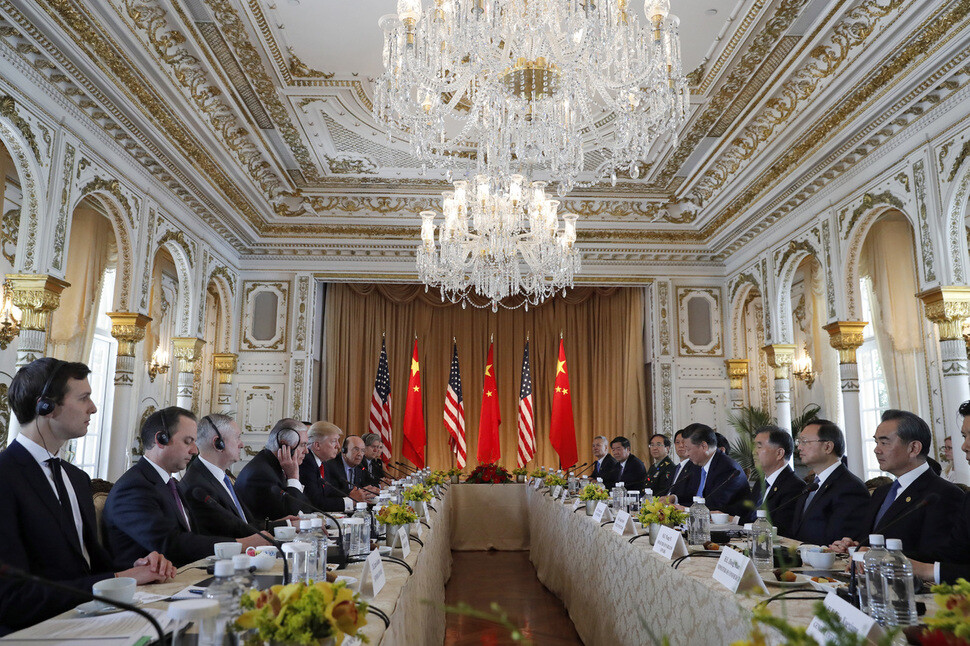hankyoreh
Links to other country sites 다른 나라 사이트 링크
[Editorial] US-China summit brings no solution to Korean peninsula problems

The first summit between US President Donald Trump and Chinese President Xi Jinping ended without achieving the initially anticipated results. There was also no official reference to the possible deployment of the Terminal High Altitude Area Defense (THAAD) system on the Korean peninsula, a topic of great interest to the South Korean government.
This summit was strongly characterized by the tendency of both parties to go no further than simply presenting a stance. It was a reconnaissance mission focused on preventing further conflict, outwardly promoting an atmosphere of friendliness.
The criticism that there was no solution to the North Korean nuclear issue or THAAD can be attributed to excessively high expectations, in the sense that such problems cannot be resolved with a single meeting.
Accordingly, in the context of the problems of the Korean peninsula, this summit is best seen as a “first step.” The only concern in this process is that the current South Korean government has adopted the same stance as the Trump Administration towards North Korea’s nuclear program and THAAD deployment, and has not demonstrated any flexibility in its resolute adherence to this attitude. This ensures that neither the US or China will much feel the need to confer with the South Korean government. Accordingly, it appears as though South Korea is being shunted aside and ignored in the problems of the Korean peninsula. This effect is heightened due to the fact that the current administration is functioning in a limited capacity under a temporary acting president, following the impeachment of President Park Geun-hye.
However, there is no leeway amid the situations unfolding on the Korean Peninsula, to give much thought to the South Korean situation in particular. Following North Korea’s ballistic missile launch on Apr. 4 just ahead of the US China summit, the possibility of increased tension continues to be the subject of discussion. The tension has increased with the US navy’s recent show of military might, the deployment of the aircraft carrier-led Carl Vinson strike group to the eastern Pacific near the Korean peninsula. Military solutions to the nuclear problem of North Korea are discussed on a daily basis in the US media and Congress. Recently the US attacked Syria in a lightning-fast response to the chemical weapons attacks. The concern here is that we cannot rule out the possibility that the Trump administration will drive the Korean Peninsula to the brink according to the calculated losses and gains in domestic US politics.
But it seems as though the main candidates for the presidential elections have been avoiding any mention of the North Korean nuclear issue as well as any talk of diplomacy and security issues if they don’t directly bring them votes. Pledging to do something once in office is also important, but it is time for candidates to be the next leader of the country to respond to the North Korean nuclear issue and speak up responsibly, including requests directed at the US and China.
Please direct questions or comments to [english@hani.co.kr]

Editorial・opinion
![[Column] Park Geun-hye déjà vu in Yoon Suk-yeol [Column] Park Geun-hye déjà vu in Yoon Suk-yeol](https://flexible.img.hani.co.kr/flexible/normal/500/300/imgdb/original/2024/0424/651713945113788.jpg) [Column] Park Geun-hye déjà vu in Yoon Suk-yeol
[Column] Park Geun-hye déjà vu in Yoon Suk-yeol![[Editorial] New weight of N. Korea’s nuclear threats makes dialogue all the more urgent [Editorial] New weight of N. Korea’s nuclear threats makes dialogue all the more urgent](https://flexible.img.hani.co.kr/flexible/normal/500/300/imgdb/original/2024/0424/7317139454662664.jpg) [Editorial] New weight of N. Korea’s nuclear threats makes dialogue all the more urgent
[Editorial] New weight of N. Korea’s nuclear threats makes dialogue all the more urgent- [Guest essay] The real reason Korea’s new right wants to dub Rhee a founding father
- [Column] ‘Choson’: Is it time we start referring to N. Korea in its own terms?
- [Editorial] Japan’s rewriting of history with Korea has gone too far
- [Column] The president’s questionable capacity for dialogue
- [Column] Are chaebol firms just pizza pies for families to divvy up as they please?
- [Column] Has Korea, too, crossed the Rubicon on China?
- [Correspondent’s column] In Japan’s alliance with US, echoes of its past alliances with UK
- [Editorial] Does Yoon think the Korean public is wrong?
Most viewed articles
- 1[Column] Park Geun-hye déjà vu in Yoon Suk-yeol
- 2[Guest essay] The real reason Korea’s new right wants to dub Rhee a founding father
- 3Why Korea shouldn’t welcome Japan’s newly beefed up defense cooperation with US
- 4[Column] ‘Choson’: Is it time we start referring to N. Korea in its own terms?
- 5Will NewJeans end up collateral damage in internal feud at K-pop juggernaut Hybe?
- 6Senior doctors cut hours, prepare to resign as government refuses to scrap medical reform plan
- 7New AI-based translation tools make their way into everyday life in Korea
- 8Thursday to mark start of resignations by senior doctors amid standoff with government
- 9N. Korean hackers breached 10 defense contractors in South for months, police say
- 10Kim Jong-un expressed ‘satisfaction’ with nuclear counterstrike drill directed at South